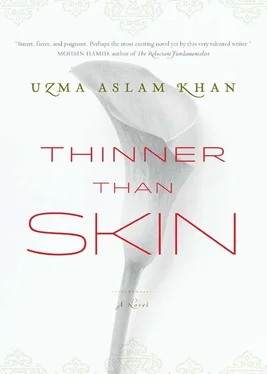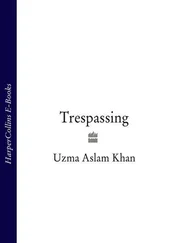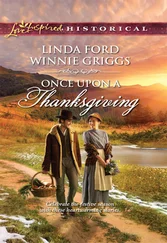I found myself feeling a little like a girl, and when I asked myself what this meant, I decided it meant hysterical. A growing panic bubbled up my gut and made me want to protest by flapping my hands and thrashing my head. I would have liked to be the size of these vicious children. I would have liked to be small and gay. I would have liked to lie on my back on one of the graves and kick my legs and scream. However, I did none of these things. The children followed me all the way down to the turn-off beyond which my cabin lay securely hidden in the thick palms of a walnut grove.
Their parents were no help. In the bazaar, the restaurant, the bus, even the damn road, eyes followed me long after I met them with my own. I was learning the full impact of the weight of those eyes. One moment they were heavy as clouds, the next, they moved through me like smoke. They could crush me and blow me away. They were a jury unto themselves, and would gladly have strung me from a telephone pole, if revenge on behalf of a herder had been worth it.
It was only me. Wes, Farhana, and Irfan were treated differently.
When children followed Wes, it was not to call him a killer. Nor to will him away. A white man, no matter how pale, is never see-through. Granted, he hadn’t been in the boat. But he’d been with us: he was one of us. Yet, not to them. He casually distributed milk toffees and soggy chips and made them skip and squeal. Clearly, he’d come here to build schools.
If Wes was a guest-savior, Irfan was still a friend. I was glad for him — but, why only me? What about Farhana? She mostly stayed in the cabin, or walked around with Wes, beside whom she’d also be seen as a guest, perhaps even a guest’s wife. Twice a guest! If not, she’d have said. She’d let it be known if people whispered, “It’s her.”
I, on the other hand, was neither guest nor savior nor friend nor wife. I was a murderer, prowling free across their turf.
One day I entered a glass and gem shop for ornaments to take back with me to Karachi for my sister, when I heard a customer ask the jeweler how “Maryam” was coping. Mysteriously, everyone around me now spoke in a tongue laced generously in Urdu. It didn’t take me long to understand that the Maryam he meant was the Maryam: Kiran’s mother. The jeweler answered that she was ill.
“Do not worry,” replied the customer. “She will find how to live up to her name.”
I decided on a different strategy. Instead of sloping away, I’d participate. In a manner I hoped was both casual and confident, I asked, “What do you mean, live up to her name?”
The man behind the counter began dusting a glass vase with an old felt cloth. I waited. He turned his back to me, placing the vase gingerly on a shelf. The shelf was cramped; two glasses grazed each other. The sound gave me goosebumps. The customer and the jeweler began speaking in a language I could no longer understand.
I lifted a clump of pink topaz and cleared my throat. They continued not to acknowledge my presence in any way other than ignoring it. I asked for the price. I was quoted four times the number scratched on the tag. The quote was delivered to the felt cloth. Somehow I knew it would not do to bargain. I left the sum on the counter.
Back at the cabin, Irfan was waiting for me, with food. I assumed Farhana was with Wes, at the restaurant. Irfan was thawing toward me somewhat, possibly because his own treatment here hadn’t soured too much.
“Eat.” He watched me stare at the cubes of chicken tikka on my plate.
That did not stop me from staring at the cubes of chicken tikka on my plate.
He asked, for the millionth time, “Are you ready to leave?”
I shook my head.
“Where will we go,” he persisted, “when you’re ready? Back to Karachi?”
“Not now, Irfan.”
“We have to decide. We have a booking up north that should be canc—”
“—I’m always running. Away. But not this time. I’m not avoiding it, the subject.”
“What is the subject?”
“This time, I’m not running.”
He sighed. “This time, maybe you should.”
The next day, over another plate of cold food, he spoke in a tone more agitated than I’d heard from him yet. Much of what he said sounded like a distant call from somewhere silty and cold. There was heightened security in the valley, worse than before we’d left for the lake, hadn’t I noticed? I couldn’t think what to say. So he continued. Shia — Sunni riots had erupted in Gilgit district to the north, where we were heading, and Mansehra district to the south, close to where I was “merrily” taking the bus each day and night like a mad man. Again he waited for a response. Again I could think of none. It was especially bad near the town of Balakot—
Now I interrupted him. “Isn’t that where Kiran’s family’s from?”
“They’re not from anywhere. They’re nomads. But, yes, they make a winter home near Balakot, near Syed Ahmad Barelvi’s shrine, where his devotees are setting up training camps. Men from the camps harass the villagers, trying to recruit their sons.” He paused. “It isn’t safe.” He threw up his hands. For Irfan, this was akin to smashing a chair. “The Karachi bomber and his accomplice are just a pretext for both sides, the militants and the government.” He paused again. “Don’t you understand? We carry a heavy responsibility, traveling with them.” He nudged his chin in the direction of the wall between our cabin and theirs.
“She wants to return,” I stated flatly, while he stared at me in disbelief.
“We’ll need an armed escort,” he said at last.
I shrugged.
“This isn’t what we’d planned.”
“I know.”
“Something happens to them, international fiasco.”
“I know.”
“Something happens to us, so what.”
“I know.”
Never was a wind between teeth more exasperated.
I walked alone in the valley, aware of being shadowed, hearing whispers before they were spoken, ducking stares before they were launched. Twice I tripped over myself when a green shalwar slid along a wall. Once I saw her chubby toes, a brown stalk caught in a toe ring. I heard her bangles. I heard the goat bells too. I clicked my camera. Nothing. At least the owls on the headstones were there, in my viewfinder, as proof. Proof of what? Perhaps only this: they existed. Ergo, I couldn’t be losing my mind. Or: they existed. Ergo, so did the green shalwar and the toe ring. Ergo, I was losing my mind.
At night I put a pillow over my head, and mostly lay awake. I assumed Farhana did too.
Irfan continued insisting a verdict had to be reached, and now Wes joined in too: were we to go on with our journey to the Northern Areas, or call it off? It was a decision Farhana and I had to make together. The problem was, we couldn’t be together. Even looking at her caused me pain. Once or twice, we snapped at each other— I said I’m not hungry! I said I don’t know if I want to stay or leave! — before withdrawing swiftly into our separate gloom. This was the only way to scrape off the pain. Snarling and retreating. It left us momentarily relieved, until we discovered ourselves erupting in a rash of rawness, followed by more pain, and the desire to scratch with increasing malice.
Many times, I asked myself, What is the pain? The pain of losing the girl, losing face, or — losing Farhana?
And then one night we did not retreat.
I’d come back to the cabin after taking the bus to Balakot to see Maryam. I learned through Irfan that the herders took their cattle to the forest nearby, to graze. I had no other plan besides walking into the forest to find her. I rode all the way there and all the way back without getting off the bus. Terrified of seeing her, I did it a second time. I rode all the way and back, my legs again refusing to move. It was cold and I was hungry. When I finally staggered back to the cabin, I tried to recall the poetry the darkness had evoked for me the night before we set out for the lake. I returned to the river, looking for the moon, and even a damn bird. Instead, I was almost attacked by dogs. I threw pebbles at canines all the way to the cabin. I knocked my toe against something. A carcass, a gun. I opened the door. Farhana was sprawled on the bed, naked from the hip down. Her face was turned away from the door. She wasn’t breathing. She’d taken her own life! I rushed forward. She raised her left foot to scratch a mosquito bite on her right calf. The gesture enraged me. I’d thought her dead while all she did was rest ! And what if someone else had walked into the cabin instead? It wasn’t even locked!
Читать дальше












